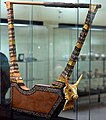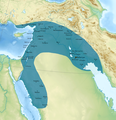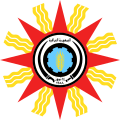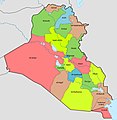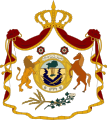Portal:Iraq
The Iraq PortalA view of Baghdad, Iraq
Iraq, officially the Republic of Iraq, is a country in West Asia and in the geopolitical region known as the Middle East. With a population of over 46 million, it is the 30st-most populous country. It is a federal parliamentary republic that consists of 18 governorates. Iraq is bordered by Turkey to the north, Iran to the east, the Persian Gulf and Kuwait to the southeast, Saudi Arabia to the south, Jordan to the southwest, and Syria to the west. The capital and largest city is Baghdad. Iraqi people are diverse; mostly Arabs, as well as Kurds, Turkmen, Assyrians, Armenians, Yazidis, Mandaeans, Persians and Shabakis with similarly diverse geography and wildlife. Most Iraqis are Muslims – minority faiths include Christianity, Yazidism, Mandaeism, Yarsanism and Zoroastrianism. The official languages of Iraq are Arabic and Kurdish; others also recognized in specific regions are Turkish, Suret, and Armenian. Modern Iraq dates to 1920, when a Mandate was created by League of Nations. A British-backed monarchy was founded in 1921 under Faisal. The Hashemite kingdom got independence from the UK in 1932. In 1958, the kingdom was overthrown and a republic was established. Iraq was ruled by the Ba'ath Party from 1968 to 2003, led by Al-Bakr and then by Saddam Hussein, as a one-party state. Iraq engaged in war with Iran from 1980 to 1988 and another war from 1990 to 1991, resulting from the invasion of Kuwait. An invasion launched by a US-led coalition as part of its "War on Terror" in 2003, sparking a war, resulted in the defeat of Ba'athists and Saddam's execution and continued with an insurgency and sectarian civil war. U.S. troops began withdrawing in 2008 and war officially ended in 2011. The subsequent continuing repression and sectarian policies of Nouri al-Maliki's government caused protests, after which a coalition of Ba'athist and Sunni militias took up arms during a campaign. The climax of the campaign was the offensive by the ISID that marked its rapid territorial expansion, prompting the return of American troops to fight the war, which lasted until 2017. Iran has also intervened since 2014, expanding its influence through sectarian parties and Khomeinist militia groups, triggering widespread protests. (Full article...) Selected article -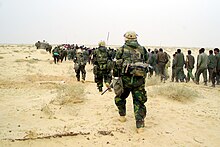 The 2003 invasion of Iraq was the first stage of the Iraq War. The invasion began on 19 March 2003 and lasted just over one month, including 26 days of major combat operations, in which a United States-led combined force of troops from the United States, the United Kingdom, Australia and Poland invaded the Republic of Iraq. Twenty-two days after the first day of the invasion, the capital city of Baghdad was captured by coalition forces on 9 April after the six-day-long Battle of Baghdad. This early stage of the war formally ended on 1 May when U.S. President George W. Bush declared the "end of major combat operations" in his Mission Accomplished speech, after which the Coalition Provisional Authority (CPA) was established as the first of several successive transitional governments leading up to the first Iraqi parliamentary election in January 2005. U.S. military forces later remained in Iraq until the withdrawal in 2011. The coalition sent 160,000 troops into Iraq during the initial invasion phase, which lasted from 19 March to 1 May. About 73% or 130,000 soldiers were American, with about 45,000 British soldiers (25%), 2,000 Australian soldiers (1%), and ~200 Polish JW GROM commandos (0.1%). Thirty-six other countries were involved in its aftermath. In preparation for the invasion, 100,000 U.S. troops assembled in Kuwait by 18 February. The coalition forces also received support from the Peshmerga in Iraqi Kurdistan. (Full article...)Selected pictureDid you know...
Selected biography - Sargon II (Neo-Assyrian Akkadian: 𒈗𒁺, romanized: Šarru-kīn, meaning "the faithful king" or "the legitimate king") was the king of the Neo-Assyrian Empire from 722 BC to his death in battle in 705. Probably the son of Tiglath-Pileser III (r. 745–727), Sargon is generally believed to have become king after overthrowing Shalmaneser V (r. 727–722), probably his brother. He is typically considered the founder of a new dynastic line, the Sargonid dynasty. Modelling his reign on the legends of the ancient rulers Sargon of Akkad, from whom Sargon II likely took his regnal name, and Gilgamesh, Sargon aspired to conquer the known world, initiate a golden age and a new world order, and be remembered and revered by future generations. Over the course of his seventeen-year reign, Sargon substantially expanded Assyrian territory and enacted important political and military reforms. An accomplished warrior-king and military strategist, Sargon personally led his troops into battle. By the end of his reign, all of his major enemies and rivals had been either defeated or pacified. Among Sargon's greatest accomplishments were the stabilization of Assyrian control over the Levant, the weakening of the northern kingdom of Urartu, and the reconquest of Babylonia. From 717 to 707, Sargon constructed a new Assyrian capital named after himself, Dur-Sharrukin ('Fort Sargon'), which he made his official residence in 706. (Full article...)
General imagesThe following are images from various Iraq-related articles on Wikipedia.
ListsTopicsCategoriesRelated portalsReligions in Iraq Arab states WikiProjectsThings you can do
Associated WikimediaThe following Wikimedia Foundation sister projects provide more on this subject:
Discover Wikipedia using portals | ||||||||







